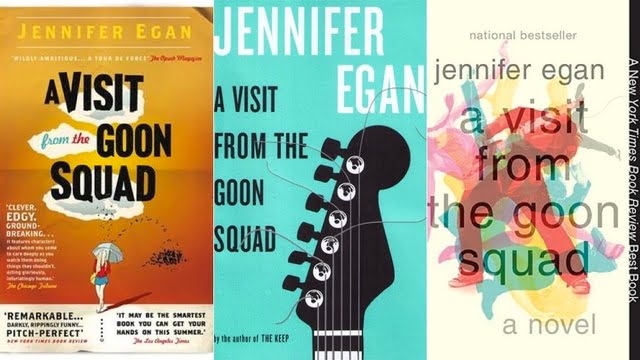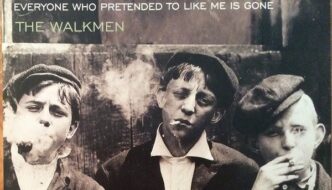
‘A Visit from the Goon Squad’ covers, source
It has been 10 years since the release of Jennifer Egan’s ‘A Visit from the Goon Squad’. Straddling the worlds of experimental and commercial fiction, the Pulitzer prize-winning novel is often cited as one of the best of the last decade. What is it about the novel which readers and critics find so laudable, and how do the interweaving stories resonate a decade on? All literature evolves with the culture in which it exists, but what unforeseen adaptions will our present unmapped territory spawn?
‘A Visit from the Goon Squad’ crowned a gradual evolution towards a scattered, nonlinear form, as opposed to the more conservative structure of Egan’s earlier work. But throughout this innovative veer, there is one element ubiquitous in Egan’s writing: a sincere, graspable emotional presence. Amid the postmodern form, and surface superficiality of the characters, ‘A Visit from the Goon Squad’ conjures visceral emotional responses through moments of human suffering, transformation and redemption. At a time when sentimentality is possibly the greatest condemnation that could be hurled at a work of literary fiction, this strive for earnestness and emotional resonance feels strangely radical.
It is no wonder why ‘A Visit from the Goon Squad’ is so evocative, as it deals with a particularly potent theme, a trauma we all face at one point or another: loss of innocence. These losses manifest themselves in various ways, from the slow and subtle, to the seemingly immediate. The character of Rhea, for example, sees her innocence dissolve over the course of one chaotic evening, during which she is given cocaine and becomes non-consensually involved in a sexual experience. At one point in the evening, Rhea even states: “I realise that I’m beginning my adult life right now, on this night”.
The character of Bennie, on the other hand, experiences a far more drawn out loss of innocence. His loss emerges over decades, as his passion for punk music becomes entangled with the capitalist reality of his career in the music industry. He ends up becoming (the antithesis of punk) one of those CEO-types, but lacks the conformist attributes to function in the fiscal framework of his role. Bennie’s experiences in the music industry chime with what the cultural theorist Mark Fisher calls ‘capitalist realism’.
Capitalist realism describes a capitalism which not only affects economics, art and culture, but acts as a “pervasive atmosphere” which infects the soul of consumer and producer alike, a kind of “invisible barrier constraining thought and action”. Though Bennie is disturbed by a host of anxieties (sexual impotency, fractured family life, ethnic identity), it is his failure to reconcile the financialisaton of his love for punk rock (a totem for youth and freedom) which defines the distorted nature of his existence and exemplifies his complex loss.
‘A Visit from the Goon Squad’ and ‘Capitalist Realism’ were published just a year apart, and there are many correlations between the worlds each book presents. However, ‘A Visit from the Goon Squad’ hints at a society in which the main thesis of ‘Capitalist Realism’ – that “it is easier to imagine an end to the world than an end to capitalism” – is perhaps less certain than some pessimists might postulate.
The last chapter of ‘A Visit from the Goon Squad’, set in 2023, depicts a scene in which an outsider artist, Scotty Hausman, is able to eschew the shackles of the profit-driven music industry and captivate a mass of people through the pure aesthetic value of his visionary music. Though Scotty’s gig is only one instance of disruption, the language and symbolism Egan employs define it as a moment of rebirth. The gig takes place in January, the first month of a new year, where, unusually, the trees are just beginning to bloom (one of the allusions to climate change Egan makes towards the end of the novel). The reference towards Scotty’s music being especially popular amongst the “pointers”, a name given to toddlers who are able to purchase music simply by pointing their “handsets” in the direction of the song, represents the ‘pureness’ of Scotty’s sound, and a rediscovered innocence in an age where capitalism is becoming more and more lecherous.
Egan herself seems to be pointing towards a world in which human desire is determined by more than the market. And, maybe, a decade on from’ A Visit from the Goon Squad’, we are now reaching the inflexion point at which capitalism must adapt to the overarching circumstances in which it finds itself, many of which, such as climate change, are self-exacerbated. The effect that the COVID-19 pandemic is having upon market capitalism is plain to be seen, but, even prior to this sea change, we were already witnessing the fragility of the current economic model. We now live in a moment where Maguire Wealth Management, a symbol of the global capitalist system, are pivoting to the opinion that “conventional capitalism is dying” and the world is “headed for something closer to a form of communism”. The last chapter of Egan’s book, though it offers only a fleeting micro-revolution, appears to envisage the beginnings of this hitherto inconceivable transformation.
Filed under: Written & Spoken Word
Tagged with: A Visit from the Goon Squad, award, book, Capitalism, Capitalist realism, characters, climate change, communism, Culture, decade, finance, innocence, Jennnifer Egan, loss, money, pulitzer, writing



Comments